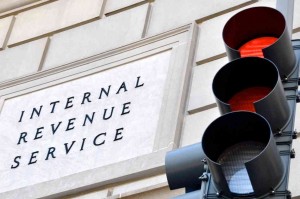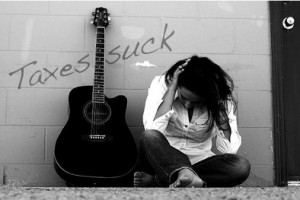Don’t you hate whenever there’s an article about taxes it always starts off with “well, it’s tax time again.” We get it, we have to pay taxes. I, for one, want to get as much money back in my taxes as possible. Some years I have to pay – this is always when I’ve worked multiple jobs. For the life of me I can’t figure out why the government decided that if you have to work more than one job they should take more money from you. But that’s not what this is about. This is about how you, as a musician, can use what you’ve bought for your craft to get more money back from Uncle Sam. This is all about musicians and taxes.
When I first found out that I was going to go on my first tour I went kind of hog wild and bought a bunch of new gear that I knew I was going to use for the tour. But honestly, I just wanted a bunch of new gear. I bought some new basses, a Traveler bass to practice in hotel rooms, new strings, cleaning supplies, and all that stuff. I kept my receipts for all this, too. I was told that if I buy gear specifically for a gig I could deduct it off my next tax form.
If you’re a musician and you want to start using receipts to get taxes back then you need to know a few things.
First of all, if you’re doing music as a job you can deduct a lot more off your taxes, i.e. gear costs, gas receipts, hotel rooms. If you’re doing this as a hobby you can only deduct as much as you’ve earned from the hobby. So don’t think you can buy a 6 thousand dollar Fodera bass, play one gig that makes you 25 bucks, and then expect to ask for your taxes back off that Fodera.
 If you’re doing music as more than just a hobby you need to know what the IRS will and will not allow you to claim. It’s an area you should tread carefully. And you better believe that you have to be ready to present documentation to prove your expenditures. No one’s going to just take your word for it.
If you’re doing music as more than just a hobby you need to know what the IRS will and will not allow you to claim. It’s an area you should tread carefully. And you better believe that you have to be ready to present documentation to prove your expenditures. No one’s going to just take your word for it.
Before we go too far here’s some solid business advice for musicians that want to make their hobby into something more:
- Make sure you are operating like a business.
- Keep good books and accurate records.
- Advertise.
- Get business cards.
- Get a business license or separate taxpayer ID number (TIN).
- Incorporate your band. Open a P.O. Box.
- Join Musicians’ organizations and/or unions.
- Copyright your work. Register your songs with a performing rights organization (such as ASCAP, BMI or SECAC).
Now that that sage advice is out of the way we can get down to brass tacks. Get it?

“See ya April 15th, folks.”
To be honest with you, when I do my taxes I have a person that does it for me. I don’t want to screw around in this area. My tax person knows what I do for a living and she knows how to enter it all into the system correctly. However, if you want to do it yourself you can fill out a Schedule C and file it with your Federal Form 1040. If you’re self-employed, you will probably have to also file a Schedule SE. (According to IRS Publication 533, you must pay self-employment taxes if your net earnings from self-employment activities were over $400.)
On Schedule C, Line A, you’ll need to know your principal business code. It’s listed in TurboTax under “Services: Personal, Professional & Business,” then under “Amusement & Recreational Services.” (So that’s what the IRS thinks musicians are!) Code 9811 is for musicians – as well as theatrical performers, agents, producers and those in related fields.
Now, if your eyes have rolled back into your head by this point you’ll probably understand why I have a tax person to do all this for me.
But what exactly can you deduct when it comes down to this? Well, the things you deduct have to be necessary and reoccurring. These expenses are necessary to you functioning as a business. You can list things like:
- Instruments
- Equipment/gear & accessories (amps, pedals, effects, straps, carrying cases)
- Consumable supplies (such as drum skins & sticks, guitar strings & picks)
- Music business books, record company directories, venue directories
- Subscriptions to trade magazines (such as Billboard and CMJ))
- Sheet music and “How-To” books and manuals
- Promotional: CD/tape duplication (for demos), photos, bios
- Office supplies: paper, envelopes, photocopies, stamps
- Fees related to maintaining your website and e-mail access for your music-related activities
- Rent for storing your gear and for your practice space
- Membership in professional organizations, associations & unions
- Professional fees (attorney, manager, agent, accountant)
- Copyright and registration fees
- Lessons & instruction
- Travel expenses
Keep in mind that some of these you won’t be able to deduct in full.
 You can deduct your home office if you run a recording studio there. However, this gets a little mysterious. Some CPAs will say that “no” you can’t deduct a home office, that if you’re a musician your office is where you perform live. Some CPAs, however, say that if you record and make money from this home office then “yes” you can deduct it. Again, this is why I have a tax person. It’s the same reason I’ll pay someone to work on my car: I just don’t have the time or patience to deal with certain things.
You can deduct your home office if you run a recording studio there. However, this gets a little mysterious. Some CPAs will say that “no” you can’t deduct a home office, that if you’re a musician your office is where you perform live. Some CPAs, however, say that if you record and make money from this home office then “yes” you can deduct it. Again, this is why I have a tax person. It’s the same reason I’ll pay someone to work on my car: I just don’t have the time or patience to deal with certain things.
If you’re trying to go this route and aiming at getting deductions for your music business you should know that self-employed people are more likely to get an audit. So if that happens to you then you might get ready to answer some of the following questions:
- Explain all the different roles you play in the music industry. (Such as performer, songwriter, studio musician, recording artist, etc.)
- What form of organization have you designed to be involved in these ventures? (Such as sole proprietorship, partnership, corporation, etc.)
- Are you self-employed for any of your activities? (File Schedule “C” and “SE”).
- From what sources do you receive income?
- How are these sources of income reported to you? (Form W-2, Form 1099, statement, settlement sheet, contractual agreement, partnership Schedule K-1, etc.)
- Who keeps up with all your records and where are the records currently located?
- What type of expenses do you incur?
- Who keeps up with your expenses and where are the supporting records located?
- What contractual agreements do you have through your business? Furnish copies.
- Have you been examined [audited] previously? If so, what were the results?
- What assets have you purchased that you use in your business?
- How have these assets been handled for tax purposes?
- Have you ever made or received any “payoffs” to obtain or maintain a position in the music industry?
- Do you ever receive cash payments? If so, what is done with the money? (Used to pay bills, deposited into a bank account, etc.)
In any case you should be ready to be able to prove everything. Document everything. Keep your receipts. Keep your contracts. Keep any written statements of expenses. Even if you think you might not need it I’d keep it anyway. Then keep all this stuff in a separate folder. I have a little business folder I use to keep all my paid bills to prove that they were paid and a place to keep all my receipts for music related costs.
Look, it might not be all worth it to you. If you didn’t spend a whole lot of money on new gear that year to play your gigs or to travel, hell, you might just let it go. However, if you’re traveling around, sleeping in hotels, dropping money on bigger and better recording gear, spending a fortune on new strings, constantly shelling out cash to fix broken straps and just keeping all your gear in working order, then I would look into how much you could get back from the government in return.
It’s your money you’re making out there and you should get it back if the government takes too much.





